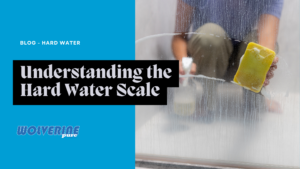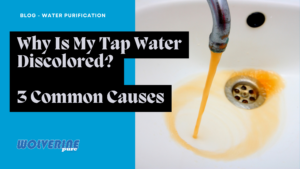Ever tried re-creating your favorite latte at home only to be disappointed by the outcome? Your water quality may be to blame. Premium coffee beans and the right grind are important, but water makes more than 90% of a cup of Joe. So it makes sense that bad water can lead to bad coffee.
Find out how hard water, high in mineral content, can affect the flavor of your coffee and the lifespan of your coffee maker.
How Hard Water Impacts Your Coffee’s Flavor
Hard water is high in excess minerals such as magnesium and calcium. While these excess minerals are not harmful to your overall health, they can negatively impact your tap water’s taste, appearance, and cleaning power.
Believe it or not, coffee experts have studied how the mineral content of water affects the flavor of the final cup, and it’s not all bad news. According to New Ground Mag, an online specialty coffee publication, “Magnesium tends to bring out fruitier, more acidic, and delicate notes, whereas calcium brings out more chocolatey, creamy, heavy notes.” But it’s a delicate balance to find the right mineral content to produce the ideal flavor. And it’s unlikely to happen on accident, especially considering around 85% of American homes have hard water.
According to the Specialty Coffee Association, the ideal calcium hardness level in water for a cup of coffee is 50-175 parts per million CaCO3. This wide range of figures encompass homes that would have slightly hard or moderately hard water. Homeowners with hard or very hard water (greater than 120 ppm CaCO3) may find their coffee tastes bitter and flat. The excess calcium in the water interacts with the caffeic acids to create an unbalanced and unpleasant cup.
Hard water is only one piece of the puzzle. Other factors such as municipal water treatment additives or organic compounds can also impact your coffee’s overall taste. Read more about these factors here.
How Hard Water Affects Your Coffee Maker
Hard water is infamous for leaving behind crusty build-up on your fixtures, tubs, and appliances. For every crusty faucet that you can see, there are unseen areas of build-up inside your home’s pipes and your appliances’ internal components. You can tell that this build-up is impacting your home when you start to notice poor performance in your dishwasher, washing machine, or your coffee maker.
You may notice build-up or clogging on your coffee maker faster than other areas in your home. That’s because calcium is more soluble in hot water. When hard water is heated in your coffee maker, the calcium carbonate precipitates and attaches to the interior of your machine. According to New Ground Mag, “water with hardness above 85 mg/L (ppm) and alkalinity above 40 mg/L (ppm) has the potential to cause a considerable buildup of scale on coffee equipment.”
Routine cleaning and maintenance will help prolong the life of your coffee maker, but over time, hard water build-up may be more and more challenging to tackle. The best way to prolong the life of your coffee machine and produce the best tasting cup morning after morning is to brew your coffee with pure, filtered water.
Chat with our team today to learn more about how a whole home system or a drinking water system may be right for you.




